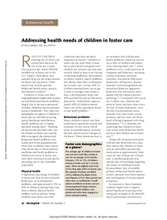RATES OF CHILDREN entering the US foster care system have been on the rise in the last 5 years. On any given day, nearly 443,000 children are in foster care in the US. Neglect, child abuse, and parental drug use are major reasons for foster care placement. Other factors may include parental behavioral health issues, poverty, and domestic violence.
Children in foster care have disproportionately higher rates of physical and behavioral health problems, largely due to having experienced complex childhood trauma and poor access to healthcare. (See Foster care demographics at a glance.) Children in foster care are classified as having special healthcare needs because health problems are so highly prevalent among them. Therefore, all nurses and providers who care for children in foster care must be able to recognize the physical and behavioral health problems commonly seen in this population and know how to address these needs. This article takes a look at physical and behavioral health problems in children and teens in foster care and offers information and tips for providing care to this vulnerable population.

